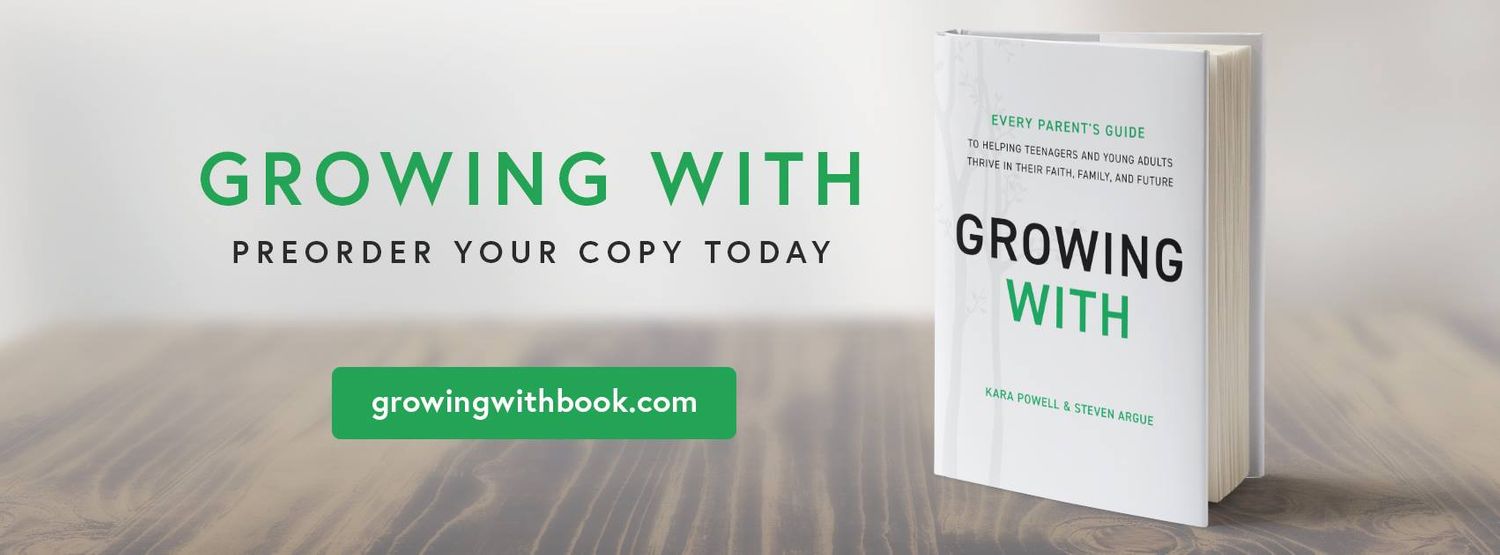
Can You Grow With?
Growing With—a must read for parents and those working with young people.
By Rev. Benji Sayre
For those of my Cincinnati area United Methodist friends and colleagues who were able to attend the Ohio River Valley District Leadership Training Day in January, you had the chance to hear about the work from the Fuller Youth Institute entitled Growing Young. This well researched work provided six core commitments that churches who succeed in ministry with young people exhibit well. These core commitments are: exhibit keychain leadership, empathize with young people, take Jesus’ message seriously, fuel a warm community, prioritize young people and families everywhere, and be good neighbors to their community. If you haven’t read Growing Young yet, I highly recommend it to you.
Out of this research and exploration, Kara Powell and Steven Argue have brought us a follow up, if you will, in Growing With. The tagline for this book is “every parent’s guide to helping teenagers and young adults thrive in their faith, family, and future.” I have had an opportunity to read an advance copy of Growing With and it is great. It is a great follow up to the research presented in Growing Young; it is a great way to understand parenting youth and emerging adults; and it is a great book to share with any parents who might be anxious or nervous about what parenting this unique age group might look like through the lens of faith.
The authors begin by helping us to better understand what the it means to be a teen or young adult. They use the term young people as an umbrella term that includes everyone from age 12 to 29; teenagers and/or adolescents to refer to 13 to 18 year olds; and emerging adults or young adults to refer to 19 to 29 year olds. While this may seem like old news, it is very helpful as they go further to discuss what it means go Grow With this segment of our population—especially of you are the parent of a child in this age bracket. Let me explain…
The authors contend that as a young person moves through these years of their life, they pass through three stages—learner, explorer, and focuser. Generally, the learner phase goes from age 13 to 18; the explorer phase goes until age 23; and the focuser stage goes until age 29. Of course, these are generalizations, but for the most part this categorization helps when we begin to look at how these stages translate into parenting. For example, while a young person is in the learner stage, parents often take on the role of teacher; while in the explorer stage, parents are seen as guides; and upon entering the focuser stage, parents become resources to their children. These stages and roles make perfect sense when we look at what it means to have Growing With parenting.
Powell and Argue introduce what they call the Growing With verbs of "Withing", "Faithing", and "Adulting" as what it means to be an all-in, Growing With parent. The reason I found this model so encouraging and helpful is that it is an active and evolving model. While I don’t yet parent 13-29-year-old, I do parent two children who seem to be moving quickly into that demographic. The idea that as my children grow, so should my parenting grow up is both helpful and needed. I am also encouraged that the things that help to identify Growing With parents are actions. Parenting is an active process and an ever-changing landscape. Parents are not called to be with or pass on faith or teach how to be an adult; parents are withing, faithing, and adulting alongside their children. I could go on and on, but let me leave you with this one nugget I took away from my reading Growing With. Parenting is hard. Parenting teens is can be really hard. As we seek to be the best parents we can be, it’s so important for us to embrace what it means to express withing that restores and repairs relationships. As our kids grow more and more independent and move from learner to explorer to focuser, this thought from the book stuck with me: “Be a wall. Be a wall they can come back to. Be a wall. Be a wall they can come back to.” Hopefully, as adults we can provide stability and security for our kids. As they grow through the stages so do we grow as well. If we can provide that wall our kids can come back to we can truly begin to embrace what it means to Grow With our kids.
This is a great book! I highly recommend it to you. If you are a parent, it’s full of helpful insights that can inform your parenting. If you are a youth pastor or responsible for young people in your church, this is amazing stuff to read and digest and then put in the hands of your parents. The book is available for preorder until March 5th, 2019 and if you do preorder, you get a bunch of cool stuff. You can get more info on preordering and the free stuff at https://growingwithbook.com/preorder/.
Happy reading!
Rev. Benji Sayre
Benji, an ordained deacon in the United Methodist Church, serves as the Executive Director of The Wesley Foundation in Cincinnati. Benji also serves as the Associate Pastor at Clifton United Methodist Church and as a Co-Founder and Coach at Colocate Ministry Consulting. When Benji and his wife, Molly, aren't working they are spending quality time with their two children.